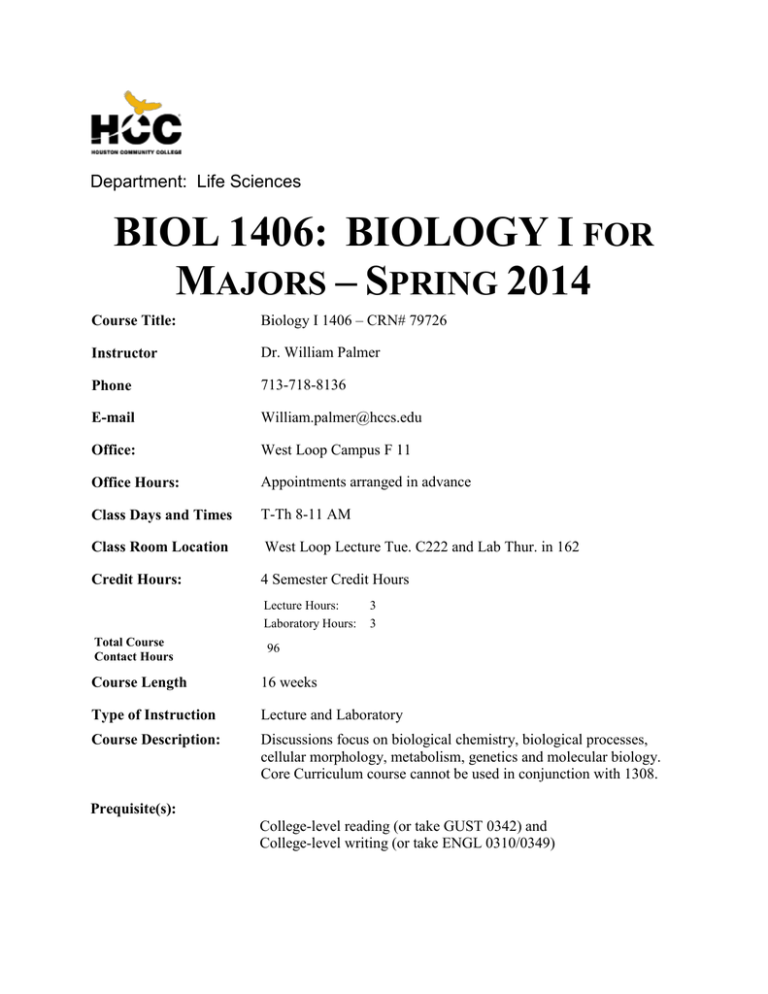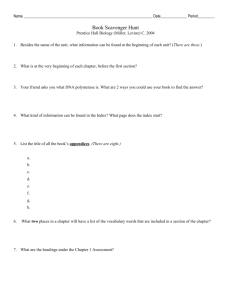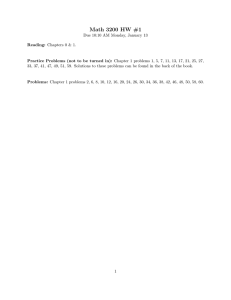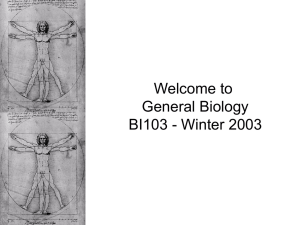Biol 1406 Syllabus TTH 8-11 Spr14.doc
advertisement

Department: Life Sciences BIOL 1406: BIOLOGY I FOR MAJORS – SPRING 2014 Course Title: Biology I 1406 – CRN# 79726 Instructor Dr. William Palmer Phone 713-718-8136 E-mail William.palmer@hccs.edu Office: West Loop Campus F 11 Office Hours: Appointments arranged in advance Class Days and Times T-Th 8-11 AM Class Room Location West Loop Lecture Tue. C222 and Lab Thur. in 162 Credit Hours: 4 Semester Credit Hours Lecture Hours: Laboratory Hours: Total Course Contact Hours 3 3 96 Course Length 16 weeks Type of Instruction Lecture and Laboratory Course Description: Discussions focus on biological chemistry, biological processes, cellular morphology, metabolism, genetics and molecular biology. Core Curriculum course cannot be used in conjunction with 1308. Prequisite(s): College-level reading (or take GUST 0342) and College-level writing (or take ENGL 0310/0349) Academic Discipline/CTE Program Learning Outcomes Program Student Learning Outcomes (PSLOs) for the Biology Discipline: PSLO#1 - Will display an understanding of biological systems and evolutionary processes spanning all ranges of biological complexity, including atoms, molecules, genes, cells, and organisms. PSLO#2 - Will integrate factual and conceptual information into an understanding of scientific data by written, oral and/or visual communication. (This may include successful completion of a course-specific research project or a case study module). PSLO#3 - Will demonstrate proficiency and safe practices in the use of laboratory equipment and basic laboratory techniques. PSLO#4 - Will apply principles of the scientific method to problems in biology in the collection, recording, quantitative measurement, analysis and reporting of scientific data. Course Student Learning Outcomes (SLO): Course Student Learning Outcomes (CSLOs) for Biology 1406: 1. The student will be able to describe the characteristics of life: its unity and diversity and the evidence for evolution through genetics, variation, and natural selection. 2. The student will be able to understand the basic requirements of life: explain atomic structure, types of chemical bonding, properties of water, and the structures/functions of the macromolecules of life: carbohydrates, lipids, proteins, and nucleic acids. 3. The student will be able to compare and contrast the structures, reproduction, and characteristics of viruses, prokaryotic cells, and eukaryotic cells, including important pathways in the metabolic processes of energy transformation, cell communication, cellular respiration, fermentation, and photosynthesis. 4. The student will understand the cell cycle and be able to differentiate between mitosis and meiosis, continuing with the principles of genetics/inheritance and to quantitatively solve classical genetic problems. 5. The student will demonstrate knowledge of DNA structure, its replication, the flow of genetic information from gene to protein, gene expression, and ultimately their methodologies and applications in biotechnology. 6. The student will develop critical thinking skills and habits of active collaborative learning by successfully participating in an INSPIRE (Innovative Science Program Initiatives To Reform Education)-oriented case study module(s). 7. The student will understand the scientific method, as well as quantitative and empirical skills to collect, record, measure, analyze, and communicate scientific data, including showing competence in the laboratory by appropriate use of the light microscope and other laboratory equipment. Learning Objectives 1.1 Explain fundamental concepts of biological sciences and how these concepts are connected within various areas of the biological sciences, at the survey level. 2.1 Acquire basic knowledge of bonding important to living systems, and understand the properties of water that make life possible. 3.1 Explain prokaryotic, animal, and plant structure and function at the level of molecules and cells, to include biological macromolecules, cellular organization, communication, cell division and gametogenesis, energy transformations, and the metabolic reactions associated with cellular activities, such as the processes of glycolysis, fermentation, cellular respiration, and photosynthesis, at the survey level. 4.1 Understand basic knowledge of Mendelian genetics, perform and interpretation of genetics problems, and of advances in the understanding of genes and chromosomes since Mendel. 5.1 Explain the molecular sequence of events involved in the flow and expression of genetic information in prokaryotic and eukaryotic cells, with special emphasis on the understanding of DNA replication, RNA transcription, and protein biosynthesis, at the survey level. 6.1 The student will develop critical thinking skills and habits of active collaborative learning by successfully participating in an INSPIRE (Innovative Science Program Initiatives To Reform Education)-oriented case study module(s). 7.1 Apply safety procedures, design an experiment, stating a hypothesis, of the quantitative analytical skills necessary for recording and analyzing data, and of the write-up of conclusions. Demonstrate basic proficiency in using the microscope and practice critical thinking and communication skills have been developed by students working in groups. 7.2 Understand how technology has affected the development of science and how scientific knowledge can be applied to various aspects of life, community, the environment, and the important social and ethical issues related to biology and medicine. Apply basic knowledge of the methodologies and applications in biotechnology, and be aware of biotechnologic career paths in the biological sciences. Student Assignments Course Student Learning Outcomes (CSLOs) for Biology 1406: 1. The student will be able to describe the characteristics of life: its unity and diversity and the evidence for evolution through genetics, variation, and natural selection. 2. The student will be able to understand the basic requirements of life: explain atomic structure, types of chemical bonding, properties of water, and the structures/functions of the macromolecules of life: carbohydrates, lipids, proteins, and nucleic acids. 3. The student will be able to compare and contrast the structures, reproduction, and characteristics of viruses, prokaryotic cells, and eukaryotic cells, including important pathways in the metabolic processes of energy transformation, cell communication, cellular respiration, fermentation, and photosynthesis. 4. The student will understand the cell cycle and be able to differentiate between mitosis and meiosis, continuing with the principles of genetics/inheritance and to quantitatively solve classical genetic problems. 5. The student will demonstrate knowledge of DNA structure, its replication, the flow of genetic information from gene to protein, gene expression, and ultimately their methodologies and applications in biotechnology. 6. The student will develop critical thinking skills and habits of active collaborative learning by successfully participating in an INSPIRE (Innovative Science Program Initiatives To Reform Education)-oriented case study module(s). A case study module on cellular respiration will be conducted. 7. The student will understand the scientific method, as well as quantitative and empirical skills to collect, record, measure, analyze, and communicate scientific data, including showing competence in the laboratory by appropriate use of the light microscope and other laboratory equipment. Student Assessment(s) The final course grade will be determined by the percentage of points earned in the following: 4 Tests @ 100 points each = 400 points 20 homework assignments = 150 points Attendance = 50 points Total Lecture Points = 600 points 1 Final Exam @ 200 points = 200 points 2 Lab Tests @ 100 points each = 200 points Lab Notebook @ 100 points = 100 points ------------------------------------------------------------------TOTAL = 1100 points (1) Instructor's Requirements You are spending a good deal of time, energy and money on this course – please, make the most of your investment! There is a school-mandated attendance requirement for this course (please see the “Classroom Evaluation” section for a description). If you’re still struggling with certain aspect of the course, please make an effort to see me and I will gladly make time to help you work through the material. (2) Make up tests are very difficult to schedule and may not be rescheduled for unauthorized absences. I reserve the right to give students who miss a test an alternate version of the appropriate test. Other assignments (e.g. critiques) not turned in on time will be docked 10% of their final value for each class day that they are late. There will be NO make up labs. (3) My purpose in this class is to act as your guide through this subject material. I also must make sure that your grade in this class indicates your mastery of the subject material required by this college. I am not here to spoon-feed you. It takes approximately 2-3 hours of study time for each hour of class time to master the material. This class will have over 96 contact hours (4 hr. credit) compared to 48 contact hours that comprise the normal class (3 hr. credit). The class and study time necessary to succeed in this class will be close to 300 hours (20 hours per week)! (4) Please do not talk during class. If you feel the need to discuss something with a classmate, please do so outside. I will not be offended if you need to take an important conversation outside briefly so as not to distract your classmates. No cell phones on in class and pagers off or on vibrate. HCC Grading Scale: A = 100- 90 B = 89 - 80: C = 79 - 70: D = 69 - 60: 59 and below = F FX (Failure due to non-attendance) IP (In Progress) W (Withdrawn) I (Incomplete) AUD (Audit) 4 points per semester hour 3 points per semester hour 2 points per semester hour 1 point per semester hour 0 points per semester hour 0 points per semester hour 0 points per semester hour 0 points per semester hour 0 points per semester hour 0 points per semester hour IP (In Progress) is given only in certain developmental courses. The student must re-enroll to receive credit. COM (Completed) is given in non-credit and continuing education courses. FINAL GRADE OF FX: Students who stop attending class and do not withdraw themselves prior to the withdrawal deadline may either be dropped by their professor for excessive absences or be assigned the final grade of "FX" at the end of the semester. Students who stop attending classes will receive a grade of "FX", compared to an earned grade of "F" which is due to poor performance. Logging into a DE course without active participation is seen as non-attending. Please note that HCC will not disperse financial aid funding for students who have never attended class. Students who receive financial aid but fail to attend class will be reported to the Department of Education and may have to pay back their aid. A grade of "FX" is treated exactly the same as a grade of "F" in terms of GPA, probation, suspension, and satisfactory academic progress. To compute grade point average (GPA), divide the total grade points by the total number of semester hours attempted. The grades "IP," "COM" and "I" do not affect GPA. Health Sciences Programs Grading Scales may differ from the approved HCC Grading Scale. For Health Sciences Programs Grading Scales, see the "Program Discipline Requirements" section of the Program's syllabi. REQUIRED TEXTS J.B. Reece, et al 2011, Campbell Biology, 9th ed., Benjamin Cummings Publishing, San Francisco, CA Biology 1406 Laboratory Manual, Houston Community College – Southwest, 4th. edition. Other Operating Guidelines Tests (100 points each, Final Exam = 200 points) There will be 4 tests throughout the course (including the comprehensive final exam). Dates for the tests are listed in the course calendar. The tests will cover material covered prior to the date of each test. Tests will be given at the beginning of class on designated dates (see course calendar) with lecture or lab following the test. The final exam will cover material from the entire course, but about 1/4th of the exam will contain material from the chapters not covered in previous tests. Homework Assignments - Students are required to read assigned chapters and to complete chapter homework assignments and Quizzes on schedule. Additional announced and unannounced quizzes during lecture or lab may be conducted throughout the semester. Attendance Policy: (50 points) You will receive 50 points for your attendance in class. For each unexcused absence, you will lose ten of these points. After five unexcused absences, the professor recommends the student drop the class. In order for an absence to be considered “excused” the student must bring some form of documentation as to the reason for the absence (e.g. doctor’s note, court record, etc.). Partial unexcused absences from class will also be considered to be “absences”. The instructor reserves the right to take attendance at any time, even several times, during class. If you wish to drop the class you must use the proper drop form, have it signed, and turn it in to the registration office before the deadline. Reading Assignments & Possible Unannounced Quizzes: It is expected that each student will read the pre-assigned section of the text BEFORE coming to CLASS each day. Reading assignments for each class will be given at the end of the previous class. Use the class schedule to stay ahead of the lectures. The instructor may give pre-lecture quizzes to make sure the students are prepared for class. These quizzes MAY NOT BE ANNOUNCED in advance. Class Participation: While there is no “formal” assessment of your participation in class, it is appreciated and will no doubt aid in your learning (and your classmates’ learning) of the material! Make-UP Exam Policy: Make up tests are very difficult to schedule and may not be rescheduled for unauthorized absences. I reserve the right to give students who miss a test an alternate version of the appropriate test. Other assignments (e.g. critiques) not turned in on time will be docked 10% of their final value for each class day that they are late. There will be NO make up labs. Warning: Students who are repeating this class for the third time will be charged an additional fee per class hour. EGLS3 -Evaluation for Greater Learning Student Survey System At Houston Community College, professors believe that thoughtful student feedback is necessary to improve teaching and learning. During a designated time near the end of the term, you will be asked to answer a short online survey of research-based questions related to instruction. The anonymous results of the survey will be made available to your professors and department chairs for continual improvement of instruction. Look for the survey as part of the Houston Community College Student System online near the end of the term. Distance Education and/or Continuing Education Policies Access DE Policies on their Web site: http://de.hccs.edu/Distance_Ed/DE_Home/faculty_resources/PDFs/DE_Syllabus.pdf Access CE Policies on their Web site: http://hccs.edu/CE-student-guidelines Final Grade “Calculator” Homework (150 points) Attendance (50 points max.) Test #1 (100 points max) Test #2 (100 points max) Test #3 (100 points max.) Test #4 (100 points max) Total Lecture Points (600 points max- 55% of Final Grade) Lab Test # 1 (100 Points) Lab Test # 2 (100 Points) Lab Notebook (100 Points) Total Laboratory Points (300 points max.- 27% of Final Grade) Final Exam (200 points max.- 18% of Final Grade) TOTAL (1100 points max., not including extra credit) Divide your total by 1100 = Final Percentage = _________________ % Letter Grade Assignment: A = 90-100% (or higher) B = 80-89 % C = 70-79 % D = 60-69 % F = 0-59 % GUARANTEED GRADUATE POLICY: Houston Community College System guarantees that graduates of its Associate of Arts, Associate of Science, or Associate of Applied Science and all Certificate programs, providing under certain circumstances, additional education and training tuition free to students lacking appropriate mastery of specified competencies. For additional information, refer to the HCCS college catalog. WITHDRAWAL POLICY: Withdrawal from the course before the official day of record (see current catalog) will result in a final grade of “W” on the student transcript and no credit will be awarded. Prior to the official day of record, it is the student’s responsibility to initiate and complete a request for withdrawal from any course. International Students: Receiving a W in a course may affect the status of your student visa. Once a W is given for the course, it will not be changed to an F for visa considerations. You may contact the International Student Office at 713 718 8520 if you have any questions about your student visa status or other transfer issues. HCC Course Withdrawal Policy The State of Texas has begun to impose penalties on students who drop courses excessively. For example, if you repeat the same course more than twice, you have to pay extra tuition. Beginning in Fall 2007, the Texas Legislature passed a law limiting students to no more than SIX total course withdrawals throughout their educational career in obtaining a certificate and/or degree. To help students avoid having to drop/withdraw from any class, HCC has instituted an Early Alert process by which your professor will “alert” you and distance education (DE) counselors that you might fail a class because of excessive absences and/or poor academic performance. You should visit with your DE professor or a DE counselor to learn about what, if any, HCC interventions might be available to assist you – online tutoring, child care, financial aid, job placement, etc. – to stay in class and improve your academic performance. If you plan on withdrawing from your DE class, you MUST contact a DE counselor or your DE professor prior to withdrawing (dropping) the class and this must be done PRIOR to the withdrawal deadline to receive a “W” on your transcript. **Final withdrawal deadlines vary each semester and/or depending on class length, please visit the online registration calendars, HCC schedule of classes and catalog, any HCC Registration Office, or any HCC counselor to determine class withdrawal deadlines. Remember to allow a 24-hour response time when communicating via email and/or telephone with a DE professor and/or counselor. Do not submit a request to discuss withdrawal options less than a day before the deadline. If you do not withdraw before the deadline, you will receive the grade that you are making in the class as your final grade. ACADEMIC INTEGRITY: HCCS is committed to a high standard of academic integrity in the academic community. In becoming a part of the academic community, students are responsible for honesty and independent effort. Failure to uphold these standards includes, but is not limited to, the following: plagiarizing written work or projects, cheating on exams or assignments, collusion on an exam or project, and misrepresentation of credentials or prerequisites when registering for a course. Cheating includes looking at or copying from another student's exam, orally communicating or receiving answers during an exam, having another person take an exam or complete a project or assignment, using unauthorized notes, texts, or other materials for an exam, and obtaining or distributing an unauthorized copy of an exam or any part of an exam. Plagiarism means passing off as his/her own the ideas or writings of another (that is, without giving proper credit by documenting sources). Plagiarism includes submitting a paper, report or project that someone else has prepared, in whole or in part. Collusion is inappropriately collaborating on assignments designed to be completed independently. These definitions are not exhaustive. When there is clear evidence of cheating, plagiarism, collusion or misrepresentation, a faculty member will take disciplinary action including but not limited to: requiring the student to retake or resubmit an exam or assignment, assigning a grade of zero or "F" for an exam or assignment; or assigning a grade of "F" for the course. Additional sanctions including being withdrawn from the course, program or expelled from school may be imposed on a student who violates the standards of academic integrity. SOFTWARE PIRACY: Law strictly prohibits unauthorized copying of software purchased by Houston Community College for use in laboratories. Houston Community College administration will take appropriate disciplinary action against anyone violating copyright laws. COMPUTER VIRUS PROTECTION: Computer viruses are, unfortunately, a fact of life. Using the diskettes on more than one computer creates the possibility of infecting computers and diskettes with a computer virus. This exposes the computers of the college, your personal computer, and any others you may be using to potentially damaging viruses. The college has aggressive anti-virus procedures in place to protect its computers, but cannot guarantee that a virus might not temporarily infect one of its machines. It is your responsibility to protect all computers under your control and use and ensure that each diskette you use, whenever or wherever you use it, has been scanned with anti-virus software. Since new viruses arise continually, your anti-virus software must be kept current. And, since no anti-virus software will find every virus, keeping copies of data (backups) is extremely important. EQUAL OPPORTUNITY STATEMENT: It is the policy of the Houston Community College System to provide equal employment, admission and educational opportunities without regard to race, color, religion, national origin, sex, age, or disability. HCCS Colleges strive to provide an excellent learning environment free from harassment or intimidation directed at any person’s race, color, religion, national origin, sex, age, or disability. Any form of harassment will not be tolerated. Changes may be made to this syllabus when deemed appropriate by the professor. Students will be notified of any changes in a timely manner. My thanks to Dr. Loesch for allowing me to use his class syllabuses as a guide. COURSE CALENDAR: Week 1 Course Introduction – Syllabus, Chapters 1 & 2 Lab. – Intro. To Lab. – Safety Issues, Scientific Method Week 2 Chapters 3 & 4 L – Basic Chemistry Homework – Chapter 1 & 2 homework in Mastering Biology Week 3 Chapter 4 &5 L- Properties of Water Homework on Chapters 3 & 4 in Mastering Biology Week 4 Exam on Chapters 1-4 Lecture on Chapters 5 & 6 L – Biochemistry: Detection of Biological Molecules Homework on Chapters 5 & 6 in Mastering Biology Week 5 Chapter 6, & 7 L – The Microscope Homework on Chapter 7 in Mastering Biology Week 6 Chapters 7 & 8 L- Cell Structure Homework on Chapter 8 in Mastering Biology Week 7 2nd Exam on Chapters 5 -8; Lecture Chapters 9 & 10 L – Diffusion & Osmotic Relationships of Cells Homework on Chapters 9 & 10 in Mastering Biology Week 8 Chapters 10 & 11 L – Enzymes Homework on Chapter 11 in Mastering Biology Week 9 Chapters 11 & 12 Lab Test 1; L – Respiration Homework on Chapter 12 in Mastering Biology Week 10 3rd Exam on Chapters 9–12; Lecture on Chapters 13 & 14 L - Photosynthesis & Spectrophotometry Homework on Chapters 13 & 14 in Mastering Biology Week 11 Chapters 14 & 15 L –Cell Division Homework on Chapters 14 & 15 in Mastering Biology Week 12 Chapters 15 & 16 L – Genetics Homework on Chapter 16 in Mastering Biology Week 13 4th Exam on Chapters 13-16; Lecture on Chapters 17 & 18 L – DNA to Protein Homework on Chapters 17 & 18 in Mastering Biology Week 14 Chapters 18 & 19 Lab Test 2 L – Biotechnology and DNA Extraction Homework on Chapter 19 Week 15 Chapters 19 & 20 L - Review Homework on Chapter 20 Week 16 *FINAL EXAM Spring 2013 Week 1 2 3 4 5 6 7 8 9 10 11 12 13 14 15 16 Dates 1/13-17 1/20-24; (1/20 is a holiday) 1/27-1/31) 2/3-7 2/10-14 2/17-21; (2/17 is a holiday) 2/24-2/28 3/3-7 3/10-14 Spring Break 3/17-21 3/24-28 3/31-4/4 Last Day for Administrative/ Student Withdrawals- 4:30pm 4/7- 4/11 4/14-18 4/18 Spring Holiday 4/21-25 4/28-5/2 5/6 Biology 1406 Lecture Final; 5/8 Lab Final Acknowledgement Page I acknowledge that I have read the syllabus for Biology 1406 and understand the effort and time commitment necessary to succeed in this Science Majors Class. (OVER 300 HOURS OF STUDY) Name_____________________________________________________ Email Address _____________________________________________ Current Phone # ____________________________________________



